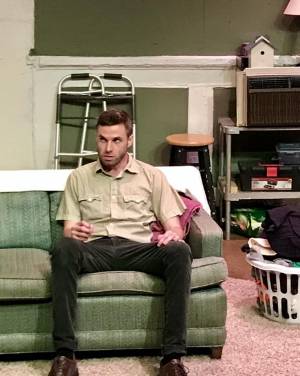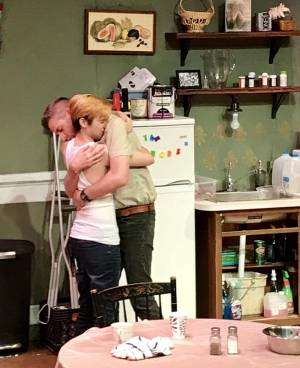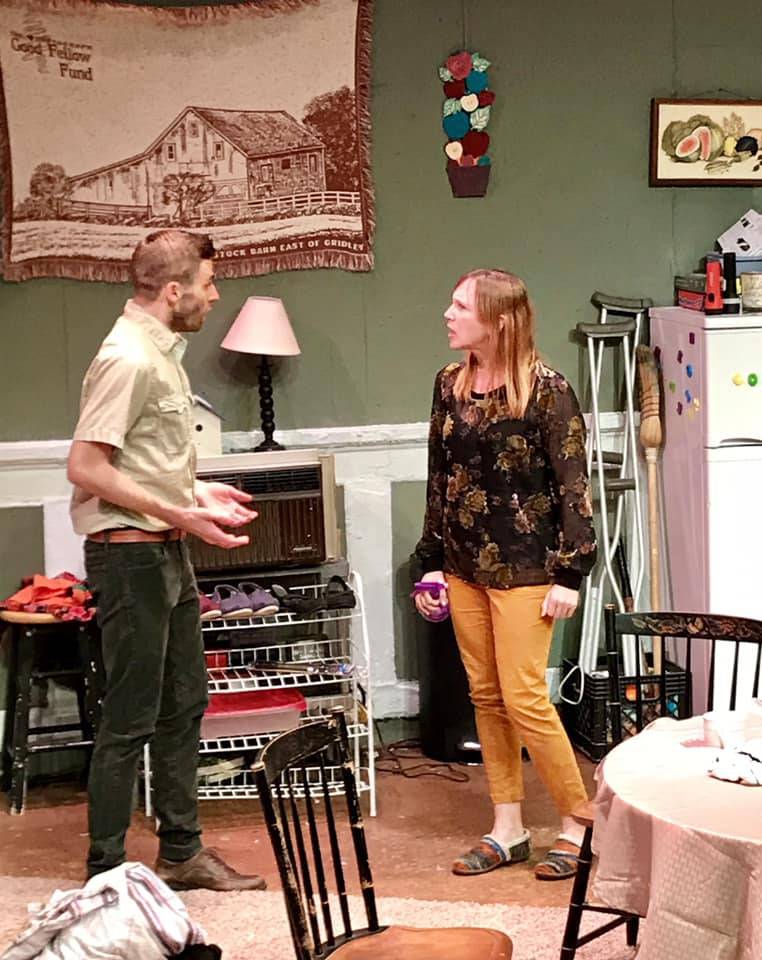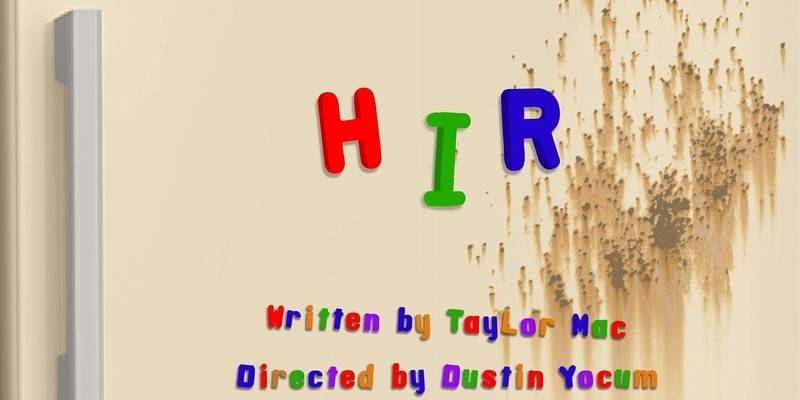The truly great comedies don’t rely on simple laughs, or clichéd jokes. Instead, they are willing to pull back the veil and show that life, although filled with great joy and laughter, is also filled with great pain and tragedy. A show that manages to find that balance leads to great theatre.
HIR, a dark comedy about family transition and tragedy, seems to hit all of these notes.This, and much more, came up as I sat down with director Dustin Yocum and cast members Cara Maurizi (Page), Jess Schlipf (Max), Nick Strole (Isaac), and Mike Prosise (Arnold).
 Smile Politely: How would you describe HIR to those who have never heard of it?
Smile Politely: How would you describe HIR to those who have never heard of it?
Dustin Yocum: A young who has been dishonorably discharged from the military is returning home to confront his father to protect his mother and sister, and get some balance back in his life. When he comes home, he finds that his father has had a stroke, and is now an invalid. His mother has taken up lots of social justice causes. And his sister is now his brother. When he comes home he expects to find balance, and normalcy. Instead, he finds sort of a chaotic sort of situation that gets into his brain a little bit with his PTSD and some of his past issues and some of the emotional conflicts. So, it’s essentially a kitchen sink drama. It’s kind of a deconstruction of the genre.
Mike Prosise: I don’t know if this is accurate or not, but the thing I have been doing is asking people if they are a John Waters fan. If you’re a John Waters fan, you’ll see there’s a bit of a John Waters flare in the show. But, it’s a story about a young man coming home, discovering everything has changed, and his struggles to come to terms with that.
Cara Maurizi: My son is returning from war, and nothing is the way it was when he left. So, it is a whirlwind of catching him up to speed of what is happening now. But it’s definitely a [dark] comedy. There’s a lot of funny, there’s a lot of tragedy, and it deals with a lot of issues. Everything from middle class life to what a war can do to a person to someone who is going through transition, and how we all deal with those things.
Jess Schlipf: It’s a really intense play. I guess if I were to sum it up, a dude comes back from war to find that his family isn’t the same as it was. And everything is changing very rapidly. And he doesn’t know how to adapt.
Nick Strole: I think it’s different for each character. There is chaos in the family when he [Isaac] gets back from war, and he spends the entirety of the play trying to put things back to the way they were before. So, he’s really trying to find a balance between what it was like before, and the chaos that it is now.
Smile Politely: Dustin, what drew you to the script?
Yocum: So I took directing class here on campus with Latrelle [Bright], and we were assigned a director to look into as part of our coursework. And I was given Taylor Mac. So, I was looking into Taylor Mac and I saw these incredibly flamboyant, large scale, just outrageous stage shows. I mean she gave me this because she absolutely knew this wasn’t my style. She was forcing me a little bit out of my comfort zone. But then judy — Taylor Mac’s preferred pronoun, as in Judy Garland — so judy had also written this sort of regular play, if you will, so I read it as just part of understanding Taylor Mac the director. And just loved it. I’ve never read anything more of the moment than this play. So, I thought I have to submit this, and the rest is history.
 Smile Politely: This is absolutely a show that establishes a precedent for casting a non-binary or trans-masculine performer, which is something that not many local directors or theatres would pursue. How do you feel about the importance of casting or pursuing a show that forces you to cast in that way?
Smile Politely: This is absolutely a show that establishes a precedent for casting a non-binary or trans-masculine performer, which is something that not many local directors or theatres would pursue. How do you feel about the importance of casting or pursuing a show that forces you to cast in that way?
Yocum: There’s a couple of things about that. One, I’ve not seen a show that calls for that before, and you know there’s only certain places where you can cast that. Champaign is a place where I thought, you know, I can cast this here. It’s a great vehicle for performers such as Jess Schlipf who can speak for themself. Jess is amazing, and I actually always had Jess sort of in mind for this too when I was reading it. I think it’s incredibly important that we can diversity in any way. This is a different kind of diversity than is often talked about especially in this community, but it is still diversity. And I’m super happy that I was able to cast it as true to what Taylor Mac actually wanted — you know one step short of an actual transitioning person which I did not get but I tried to get the best thing I could out of the situation. But yeah. I think it’s incredibly timely, incredibly important, and I’m super happy.
Smile Politely: How has it been working with this cast?
Yocum: Incredible. This cast is so dedicated to character, so we’ve done a lot of just sitting around talking like this about character, talking about relationships, talking about who these people were before the play even starts. We’ve read journal articles. We’ve had conversations about PTSD. Actually, Nick and I, who plays Isaac, just met with the Veterans Resource people on campus, and kind of tried to get into the mindset of what some PTSD ticks are. And what returning military issues are. We’ve looked into what the physical characteristics of a stroke victim are like so we can stay true to the movements. So, this has been sort of an academic process which has been phenomenal because we get to have fun and move around and be crazy, but we do a lot of thinking.
Smile Politely: How has your approach to this show differed in comparison to previous shows you’ve directed?
Yocum: I’m always a researcher, and I like the research part of directing. But the difference this time is that the cast has really come in on it [the research] with me, and are doing their own research. And they’re getting involved in it rather than me just blurting it back out to them. It has been phenomenal to see that dedication to their role. So, the process has been different in that it has been academic as a team rather than just the director bringing these things to the show.
 Smile Politely: What have been some challenges in portraying your character? Any aspects that are easy or that you connect with?
Smile Politely: What have been some challenges in portraying your character? Any aspects that are easy or that you connect with?
Prosise: There aren’t a lot of stage directions about how exactly the stroke has affected Arnold physically. He speaks in one or two word remarks or sounds throughout most of the play. But I don’t know necessarily my choice or there’s some sort of physical reason. He’s only able to say a few words. So, yeah, I guess the challenge is portraying it respectfully, and realistically because I think the trap of this character is to be the comic relief. And we really shouldn’t be laughing at it.
Maurizi: Well, that is interesting because when I first read the play I wasn’t sure how much Paige and I have in common. And then the more we dove into the part, dove into the play, dove into our relationships as characters, I started to really understand her. I still think I’m nothing like her. I wouldn’t react to things in the same way she would, but I understand her and I understand her journey. And I think I can relate to her as a mother. The most important thing for me was to figure out what my big want was. What was my motivation. And once I understand what my motivation was, all of my actions made sense. Until that point, I thought she was… Woo! I was having a really hard time connecting. Last week, we finally felt like ‘Here she is! We found her!’
Schlipf: This character is taking hormones, and I have chosen not to [Schlipf identifies as non-binary]. There is still the trans-identity that I still ascribe to. As far as challenges, for me it’s being more masculine. I’m a small person, and I was raised feminine, so I have a hard time with that. But that’s something Max goes through as well, having a hard time feeling like ze [one of Max’s preferred pronouns] has to do; like make up for the masculinity. And that is something I have difficulty with, especially playing this role.
Strole: Gosh. Isaac is suffering from PTSD, and has this rage in him that I don’t have at all. But it doesn’t come from nowhere. I’ve really been researching his character. He’s had trauma from the war, and trauma from his father abusing him and the rest of the family. Just the moments where his PTSD is triggered, and it just goes from calm to full rage has just been very foreign to me. I’ve been discovering so many different things along the way.
Smile Politely: What are the reasons someone should see the show? What do you think the audience can connect with and relate to? Why should HIR be theatre goers’ top priority?
Prosise: My selling point has been that I’ve never read a play that is more of the minute, that is more contemporary, than this one. That has had more intense focus on exactly what is in the Zeitgeist with how we are discovery as a society that gender is fluid. So, there’s that. And there’s also this power struggle now that kind of the white male patriarchy that is just sinking its claws into and doesn’t want to let go. That is the exact…that is barely a metaphor in this play. I can’t think of a play I’ve been in or seen that is speaking more to what everybody is talking about right now.
Maurizi: This is a really timely play. It’s up to the minute with the issues a family is dealing with: gender identity, the middle class, and the decline of the middle class. I think a lot of people are going through that in different ways. Everybody knows someone who has gone through trauma. Everyone knows someone or is going through a difficult part in their life. Plus, it’s just a really, really well written play. I’d even recommend people see it more than once. It’s going to catch you off guard, and you’re going to go ‘Wait. When did that happen?’ You’re going to want to go back, and see the things you missed. It’s so worth seeing. The chemistry between everyone is going to be so palpable.
Schlipf: It’s a very good script, first of all. It offers a little “crash course” on gender. I think you can learn a lot about gender, and about patriarchy. I feel like it’s more of an experience.
Strole: It’s about the American family today, and the state it’s in. And how people from different generations are trying to have a conversation, and are just meeting conflict. This play is getting towards some sort of conversation, but ends up showing that sometimes that’s not possible. And that sometimes the past and the present and the future can’t always join in harmony.
Yocum: I think, most importantly, this is the most of the moment show that I’ve ever read. So, all the issues are there. And to go along with that is the thing I love about this show is that it’s hilarious, and it’s also heartbreaking. I mean it is the perfect definition of both a comedy and a drama. And I think, you know, if you want to go to the theatre, you want to feel. This show will make you feel.
****
For tickets, use the Station Theatre’s new online ticketing system here.
HIR
Station Theatre
223 N. Broadway
Urbana
November 1-4, November 7-10, November 14-17, 7:30 p.m.
November 11th, 3 p.m.
Photos by Thom Schnarre. Graphic from Facebook.








